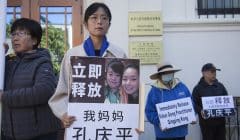“Zero-Out Campaign” Intensifies Persecution of Falun Gong Practitioners in Yitong County, Jilin Province

Based on an original report from Minghui.org
In August 2020, government authorities in China began to force public servants and community officials in Yitong County, Jilin Province to join its nationwide “Zero-Out Campaign” to further intensify their persecution on Falun Gong. The duration and number of practitioners targeted make this operation one of the most brutal of recent years.
An estimated two to three hundred practitioners in Yitong County were threatened to sign statements renouncing Falun Gong. With the inclusion of practitioner’s families, authorities harassed a thousand people in the county in the last year and a half.
Persecution Tactics
Generally, steps authorities have taken to persecute the practitioners have occur in the following order:
1. Frequent internal meetings to plan persecution operations and create an atmosphere of fear.
2. Deceiving practitioners to believe community officials and police officers do things out of the practitioners’ best interests
3. Threatening to take the practitioners’ livelihoods away.
4. Threatening to take away the livelihoods of practitioners’ families, creating family tensions to pressure practitioners to renounce their faith.
5. Incarcerating practitioners in brainwashing centers and torturing them.
6. Forcing practitioners sign irrelevant documents and gradually misguiding them into signing the statements to renounce Falun Gong.
The tactics are elaborated below.
1. Premeditated Planning
Authorities in Yitong County study the practitioners, their families, and their work situations carefully before making plans to persecute them. Sometimes the authorities assign tasks for the practitioners’ spouses, children, siblings, and employers, employing social pressure for practitioners renounce their faith.
An example is when authorities threatened a practitioner’s grandson from being admitted to college if the practitioner refused to sign the statements. Another example is where a practitioner’s husband was suspended from work and not allowed to return unless he forced his wife to sign the statements.
Practitioners living outside of the town were also not spared. The authorities either made harassment calls to the practitioners or forced practitioners’ relatives to take them to find the practitioners.
2. Inducing an Atmosphere of Fear
The officials held frequent meetings to plan for the persecution. Besides the police, agents from the 610 Office, members of the Political and Legal Affairs Committee, and other public servants outside of the judicial system attended the meetings. Hundreds of practitioners were put on a blacklist.
The practitioners’ relatives who work in the government or state companies were also given the task of making the practitioners sign the statements renouncing their faith or risk losing their jobs or future promotions.
Members of the Political and Legal Affairs Committee ordered the local police and CCP members to go door to door and talk the local practitioners into signing the statements. If the practitioners refused, they could face prison time, contract cancellation on rented farmlands, and impact their children’s prospects.
The officials also mobilized many officers to harass the practitioners or acted covertly and used deceptive means to persecute the practitioners.
In mid-December 2020, the county mobilized 16 vehicles and two dozen officers to harass practitioners in Majiatun Village. Those who refused to sign the statements were taken directly to a brainwashing center.
3. “Friends” Turned CCP Agents
Some practitioners’ relatives have friends working in the judicial system. These friends would disclose “insider information” to the relatives and express how dire the situation was and talk about the severe consequences the practitioner would face for refusing to sign the statements.
Because the information came from a friend or someone close who appeared to be trying to help, it would sound credible to the practitioners. This in turn created a fearful atmosphere, putting great pressure on practitioners and their families.
Unfortunately, most of this “insider information” is likely a hoax to create pressure for the practitioners. The friends of the relatives may normally be nice, but if given orders from higher-ups, they will use any means to accomplish their goals.
4. Hypocrisy and Deception
The harassment was usually carried out by community officials or local police, and occasionally employers. They either phoned the practitioners, visited their homes, or told them to report to the police station. They told the practitioners that they sincerely wanted to help get them off the CCP’s blacklist and promised to never bother them again if they signed the statements.
Sometimes they also talked to practitioners’ families and deceived them into signing the statements for the practitioners. The families are terrified and in a state of constant worry for their kin as the persecution has continued for over 22 years. Some of them may not realize the CCP’s deceptive nature and end up falling for the trick.
A few practitioners’ families have signed the statements for them. One of the practitioners continued to be harassed by different officials.
A female practitioner’s son signed the statements for her and destroyed all her Falun Gong books. However, the CCP officials still came to demand that she attend a brainwashing class even after she stopped practicing.
5. Threatening of Livelihood
If their deception fails, the CCP officials resort to taking away the practitioner’s livelihood. Anything related to the practitioner’s interests could be used as leverage, including their jobs, their families’ jobs, education opportunities, pensions, basic living allowances, and rented farmlands.
6. Frequent Harassment to Create Mental Pressure
If all the above failed, the authorities would make frequent calls to the practitioners and their families, who are non-practitioners, to put pressure on them. This would cause the families to blame and turn against the practitioners, escalating the external problem into the domestic sphere.
7. Implication of Family Members
The practitioners’ spouses often suffered the most in the CCP’s frequent harassment. The implication strategy expanded the harassment to include the practitioners’ children, elderly parents, siblings, and grandchildren. The authorities would threaten their children’s jobs in public offices, and grandchildren’s future education and military options. This would create anger and infighting within the family.
The local police threatened to disqualify a practitioner’s grandson from taking the college entrance exam this year. The police also threatened to take her and her husband’s pension away and ruin her son’s job. In the end, her son fought her, and her husband beat her, forcing her to sign the statements.
Another practitioner moved out of town to avoid the persecution. Her son and daughter-in-law found her and wanted her signatures. After she refused, her daughter-in-law threatened to divorce her son and take her grandson away and prohibit her from ever seeing her grandson.
8. Violent Arrests and Brainwashing
When all else failed, the authorities mobilized excessive police force to arrest the steadfast practitioners.
The county officials also held brainwashing sessions in July 2020 and three more between December 2020 and January 2021 to force practitioners to renounce their faith.
Original Article: https://en.minghui.org/html/articles/2021/5/1/192125.html










